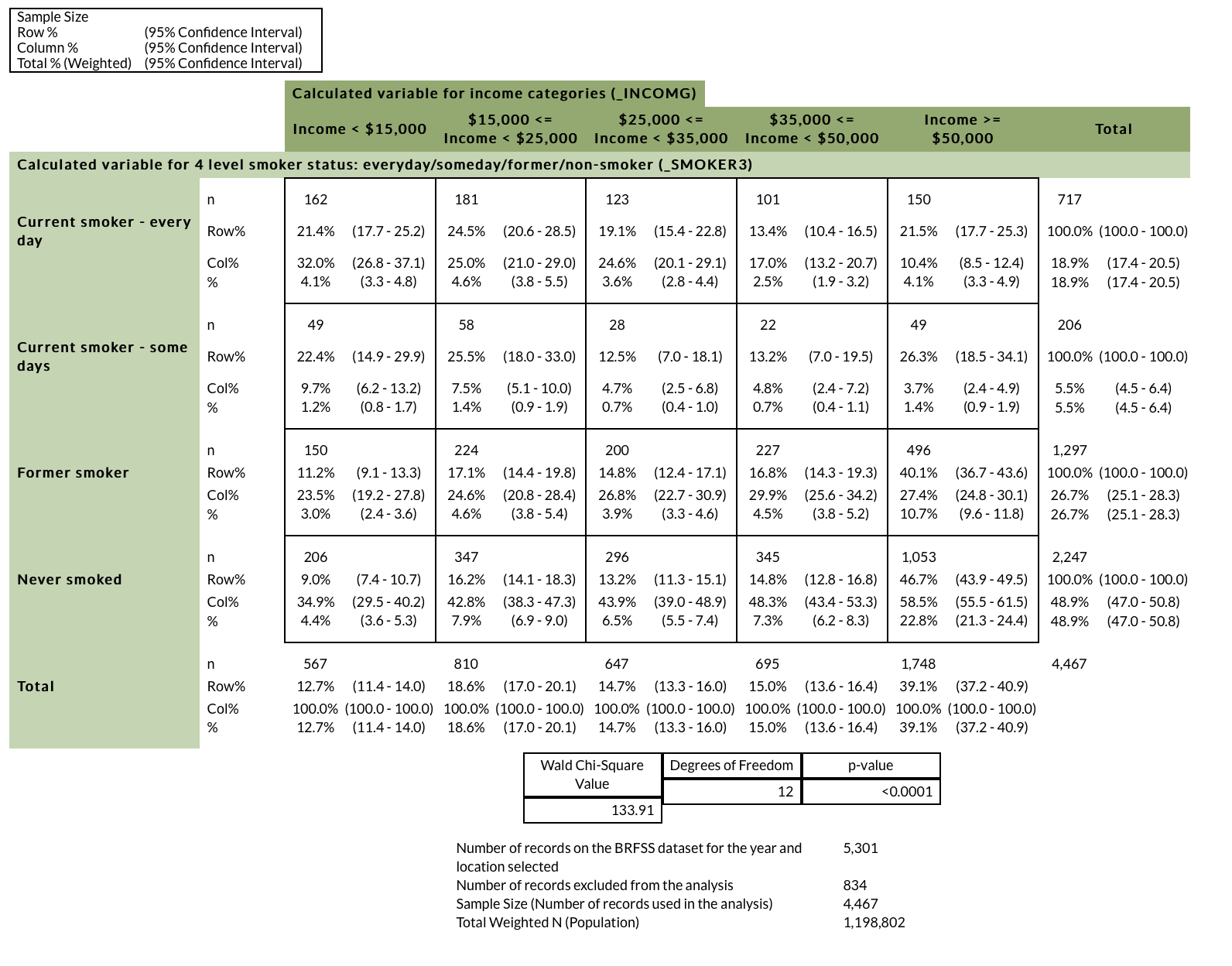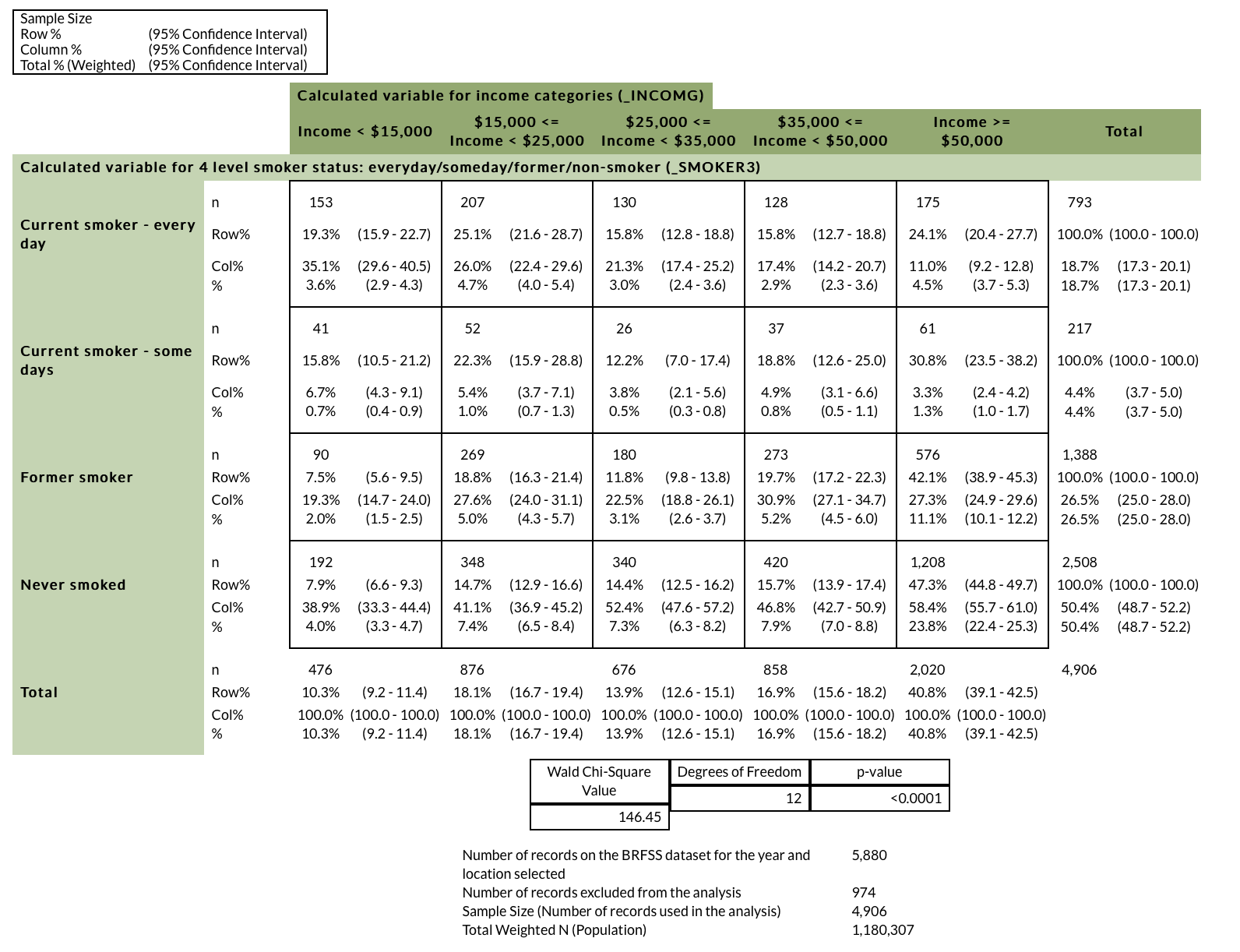The CDC cross-tabulation tool allows us to examine patterns and trends common among U.S. respondents from West Virginia and then extrapolate the results to the general population, i.e., the entire U.S. population. An exciting question during this tool was chosen as a test of the COVID-19 pandemic as a stressor causing increased desire to smoke among people of different income levels (CDC, n.d.). Research supports the stressor nature of the COVID-19 pandemic, caused by extensive social and physical restrictions on the usual comforts of life (Livana et al., 2020). Meanwhile, studies also show that people resort to smoking when they are under severe stress (Cho et al., 2020). Consequently, it is logical to assume that many people started smoking more frequently during the lockdown because they were experiencing more regular stress. In this case, the use of the income variable is an additional facet of the hypothesis described, allowing us to evaluate whether there is any divergence in trends between the rich and the poor. To begin with, one needs to examine patterns that are fair for 2019:

For 2019, statistical significance (p <.05) was confirmed, meaning that there were indeed differences in smoking frequency between groups of people with different incomes. For example, people with incomes over $50,000 were likelier to have never smoked or quit, while respondents in the two groups with incomes under $15,000 and between $15,000 and $25,000 were more likely to smoke daily or on some days. If one looks at the 2020 data, which is also statistically significant, one finds that the percentage of affluent people who started smoking every day has increased, but so has the percentage of people who quit. In addition, the percentage of poor people who smoke frequently has also decreased. In other words, the data cannot support the hypothesis, but it was clear from the data that wealthier people were significantly more likely to say they had never smoked than people from less affluent households, so one can assume that economic status is a predictor of smoking initiation.

Based on the findings collected, changes in social well-being practices and organizational culture can be influenced. First, using cross-tabulation, it was found that during the COVID-19 pandemic, West Virginia residents did not become more likely to smoke in the universal sense: the wealthy did become more likely to smoke, while poor residents became less likely to smoke or gave up smoking altogether. This data may confirm the economic and psychological burden of the pandemic. An increase in frequent smokers may indicate stress for wealthy people, who almost certainly own businesses or hold highly skilled jobs. Hence, mental wellness programs and training in mindfulness and stress-resistance practices are needed for these people. In contrast, a drop in the number of frequent smokers among poor residents may be evidence of the need to save money in an uncertain environment — people may have given up cigarettes to save money when prices began to rise substantially. In this sense, improved organizational practices could be realized by allocating commercial or government material support for low-income people who are forced to save money. Finally, people in the affluent economic classes in 2020 were more likely to claim to be former smokers, which means they may have quit for reasons related to social constraints. One should not rule out the possibility that being forced to stay at home and take care of their lives rather than work has prompted people to pay more attention to their health.
Dissemination of findings can be accomplished by publishing statistics in print and virtual newspapers and magazines and through social ads that teach mindfulness practices to viewers. Consequently, partner groups are primarily the media, community organizations, and hospitals. A press release should be issued and sent out to interested groups so they can publicize the news. The plan is that more people will be able to understand the enormity of the pandemic and how it non-universally affects diverse groups of residents. Increased discussion of these topics could encourage governments and organizations to consider supplying material support for low-income residents and mental training for the affluent.
References
CDC. (n.d.). Cross tabulation. CDC.
Cho, H. Y., Chun, S., & Choi, Y. (2020). The paradox of smoking & perceived stress: Do graphic health warnings influence smokers under high stress in adverse ways.Health Communication, 35(11), 1368-1375.
Livana, P. H., Mubin, M. F., & Basthomi, Y. (2020). ” Learning task” attributable to students’ stress during the pandemic Covid-19. Jurnal Ilmu Keperawatan Jiwa, 3(2), 203-208. Web.